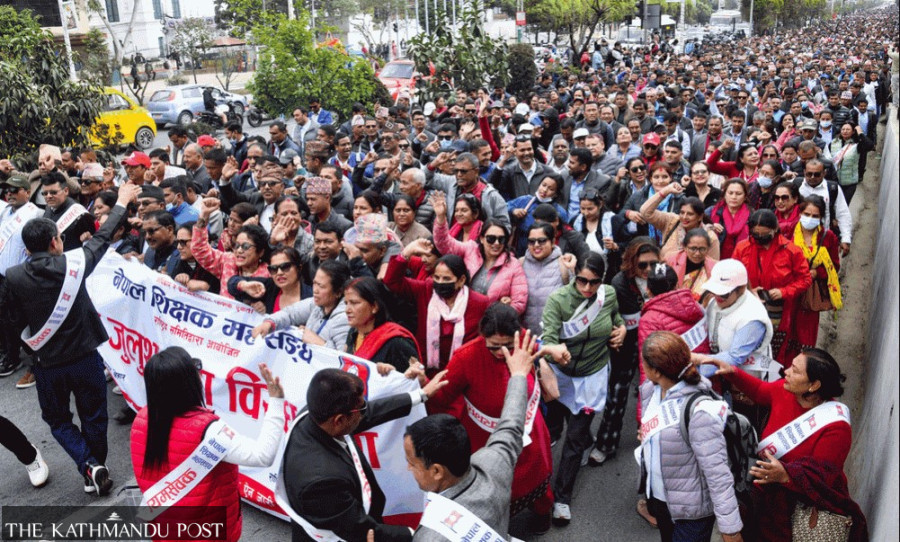National
Teachers warn of fresh protest over school bill
Fears of delayed legislation grow as the House calendar for the session ending June 28 has omitted the bill.
Binod Ghimire
With hardly a week before the deadline to endorse the School Education Bill, it is still unclear when the Education, Health and Information Committee of the House of Representatives will finalise it for tabling in Parliament.
On April 30, chief whips of the Nepali Congress and the CPN-UML inked a deal with the Nepal Teachers Federation to get the bill endorsed from the lower house by June 29. The commitment to endorsing the bill was the reason the teachers ended their month-long protest.
However, the House committee has yet to finalise the bill, and it is still unclear when the meeting will be called. “I am holding consultations. The date for the next meeting will be finalised by tomorrow [Monday],” Ammar Bahadur Thapa, chair of the House committee, told the Post.
Asked if it would be possible for the bill to be endorsed by the deadline, Thapa said they would try.
After over a month-long discussion, a panel under the Education Committee led by UML lawmaker Chhabilal Bishwakarma forged consensus on most of the bill’s contentious issues, except the regulations of private schools and managing early childhood development. The panel settled most of the 1,758 amendment proposals in the bill, some of which were mutually contradictory.
However, presenting the government’s position on several provisions in the bill, the Education Minister Raghuji Pant sought revisions on several agreed-upon provisions. “The education minister’s backtracking on agreed provisions is one reason for the delay in the committee’s meeting,” said a committee member. “Most members are against his proposal.”
The education minister has proposed reviving the district-level education offices, which are subordinate to the federal government. The Bishwakarma-led panel had agreed not to retain such offices at the district level, citing the constitutional provision that all school-level educational authority lies with local governments.
Pant, arguing that education has been listed as the concurrent authority of all three tiers of government, proposed that each district have a District Education Office. The Nepal Teachers’ Federation and education ministry officials support this.
On April 10, 2018, the government decided to place the District Education Offices under the chief district officers. However, following criticism that keeping the education office under district administration was impractical, the Cabinet on December 24, 2018 reversed the decision and brought the offices back under the federal Ministry of Education.
Experts on federalism say there is no need for the federal government’s subordinate offices at the district level.
Pant has also stood against the parliamentary panel’s agreement to retain the existing Centre for Education and Human Resource Development. He is for replacing it with the Department of Education. On July 17, 2018, the government replaced the department with a centre.
Likewise, Pant is also for the continuation of the Secondary Education Examination and has proposed that the test not be scrapped but be held at the provincial level instead.
In his proposal, Pant is against the mandatory conversion of private schools into trusts. Dozens of amendment proposals to the bill have sought to convert the existing private schools to trusts. While some are for giving them just five years, others say they should be given up to 20 years. The minister, however, is in favour of making such conversation voluntary. Umbrella bodies of private schools have been lobbying against their conversion into trusts.
“There can be some changes in the agreed-upon provisions. However, I will not allow them to revert fully,” said Thapa, the committee chair.
As the legislative delays finalising the bill, the federation has started putting pressure on the political leadership to act in line with the agreement. On Sunday, a team from the federation met Nepali Congress President Sher Bahadur Deuba, requesting him to take a special initiative to ensure the bill’s timely passage.
“We believe the bill will be endorsed by the deadline. We will be compelled to launch new protests if that doesn’t happen,” said Nani Maya Parajuli, vice-chair of the federation.
Teachers’ scepticism that the bill will not be endorsed by June 29 has increased, as the latest lower house calendar does not mention it. The calendar for the House meeting until June 28 has already been finalised.
A ruling party leader, however, claims the bill will be endorsed by the specified date. “We cannot include any bill in the calendar until it gets endorsed by the respective House committee. I want to reiterate that we are fully committed to endorsing the School Education Bill within the deadline,” said Mahesh Bartaula, UML chief whip.




 10.12°C Kathmandu
10.12°C Kathmandu















